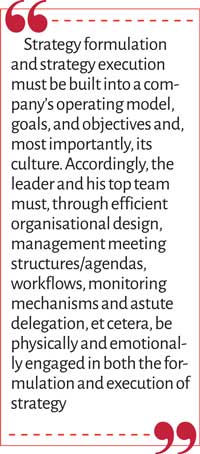Thursday Feb 19, 2026
Thursday Feb 19, 2026
Wednesday, 10 May 2023 00:20 - - {{hitsCtrl.values.hits}}

The moment has arrived for Sri Lankan corporates to focus less on intellectuality, analysis, and strategy formulation and more on executing and making strategy work
 “Although he is a key person in formulating our strategy and is totally supportive of it, he fails in executing it and we end up not meeting our strategic goals and objectives,” is the typical comment made by boards, and top management, during discussions I have with them in scoping bespoke leadership coaching programs. A well-executed strategy is key to achieving a sustainable positive outcome. As is implied by this statement, Strategy Formulation and Strategy Execution are inextricably intertwined as parts of one system.
“Although he is a key person in formulating our strategy and is totally supportive of it, he fails in executing it and we end up not meeting our strategic goals and objectives,” is the typical comment made by boards, and top management, during discussions I have with them in scoping bespoke leadership coaching programs. A well-executed strategy is key to achieving a sustainable positive outcome. As is implied by this statement, Strategy Formulation and Strategy Execution are inextricably intertwined as parts of one system.
They are interdependent and enjoy a symbiotic relationship. The efficacy of a strategy is dependent on both formulation and execution happening in cohesion. In this light, I would not say that Formulation is more important than Execution or vice versa. However, based on my knowledge, and experience, of Sri Lankan corporates, both private and public, I can state with firmness that poor Execution has, often, been the main offender in a corporate’s failure to secure the competitive advantage they expected to derive from their Strategy.
Current Sri Lanka personifies a “VUCA” world in every respect – Volatile, Uncertain, Complex and Ambiguous.
From a constitutional crisis in 2018, Easter bombings in 2019, COVID-19 in 2020 to an ongoing economic crisis precipitated by mismanagement, corruption, nepotism, unequal application of the law and non-meritocratic decision making, under successive governments, Sri Lanka has seen it all. In this environment of chaos, turbulence, change and disruption, a leader’s ability to convert and translate strategy into action is critical. The effective execution of a good strategy differentiates the winners from the “also rans” in business.
Execution is a notorious and perennial challenge, and it is a poorly addressed issue in the contemporary business world. The absence of effective execution is, in the opinion of many pundits, the biggest obstacle to organisational success and the root cause of most corporate failures, and disappointments. Company boards and top management find it very convenient to attribute underperformance against competitors and/or the non-achievement of internal goals and objectives to various other causes than admit it was due to poor execution.
As highlighted by me at a recent workshop on Integrated Performance Management, we have a fundamental problem in Sri Lanka. Most corporate leaders and top management think of execution as being the tactical side of business. They believe their focus must only be on what they perceive to be the bigger, and more important issues. In fact, it is not uncommon to come across C-level and other top-level managers who believe that strategy execution or implementation is “below them.” Execution is left to the plebs. Such thinking is completely wrong. Execution is not just tactics. It is a regimented discipline. How it combines with formulation determines the extent of success or failure of a strategy. After all, there is no point in executing a poor strategy nor is there value in formulating a great strategy which is never implemented.
Strategy formulation and strategy execution must be built into a company’s operating model, goals, and objectives and, most importantly, its culture. Accordingly, the leader and his top team must, through efficient organisational design, management meeting structures/agendas, workflows, monitoring mechanisms and astute delegation, et cetera, be physically and emotionally engaged in both the formulation and execution of strategy.
A discipline of its own
Execution must not be down rated. It must be driven from the top and the tone must be set by the top. Many business leaders spend vast amounts of time learning and promulgating the latest leadership and management techniques. But their failure to understand and practice execution negates the value of all they learn and preach. As was noted by Ram Charan, Indian American Business Consultant and Larry Bossidy, American CEO and Author, in their book, ‘Execution; The Discipline of Getting Things Done’, “Execution is a specific set of behaviours and techniques that companies need to master in order to have competitive advantage. It’s a discipline of its own.”
Why is effective execution proving to be illusive? Behavioural experts opine that it is easier, particularly in large organisations, to formulate strategy than to execute strategy. They say that although many progressive organisations now involve all its employees, individually and/or collectively, in formulating strategy and architecting, both long and short term, business plans, through bottom-up and top-down approaches, the final strategy is, in the main, the decision of the board and top management. An effective leader, then, uses such output in inspiring a shared vision in his followers. However, strategy execution requires the continuous, collaborative, physical, and mental involvement of every employee in performing his role.
 Leadership gurus say that strategy formulation is more “mind” than “heart” and that strategy execution is more “heart” than “mind.” Quoting Ronald Regan, the 40th President of the United States of America: “The greatest leader is not necessarily the one who does the greatest things. He is the one that gets the people to do the greatest things.” Besides involving more people, strategy execution plays out over extended periods and poses communication challenges down the organisation, across the organisation and across different functions and operating units. Linking an organisation’s mission, vision, purpose, and values with the key result areas of individual employees via an integrated performance management framework is a necessary, yet daunting task and it is not everyone who possesses the traits, behaviours, and skills to do so.
Leadership gurus say that strategy formulation is more “mind” than “heart” and that strategy execution is more “heart” than “mind.” Quoting Ronald Regan, the 40th President of the United States of America: “The greatest leader is not necessarily the one who does the greatest things. He is the one that gets the people to do the greatest things.” Besides involving more people, strategy execution plays out over extended periods and poses communication challenges down the organisation, across the organisation and across different functions and operating units. Linking an organisation’s mission, vision, purpose, and values with the key result areas of individual employees via an integrated performance management framework is a necessary, yet daunting task and it is not everyone who possesses the traits, behaviours, and skills to do so.
Effective executioners, pardon the pun, are emotionally intelligent – EQ high, and, therefore, have the mindfulness to cope with unpleasant information, the openness to accept and tolerate opposing views, the courage and objectivity to be firm with underperformers and the versatility to deal with the ambiguity which exists in a large and complex organisation. Authenticity is the cornerstone of emotional intelligence and emotional fortitude. Honest, open, forthright, and candid conversations are central to execution and, invariably, give rise to fact based, data backed dialogues which elicit accurate information, invite challenge/questions, encourage employees to air the bitter truths than the “yes sir” sounding sour lies and enable the regular review of strategy and course corrections.
Execution is, by its very nature, complicated. Formidable roadblocks and/or hurdles, both anticipated and unanticipated, get in the way of the execution process and seriously injure the implementation of the strategy. Make no mistake, the road to glory is full of landmines and potholes which must be adroitly navigated for execution success. It is a test of one’s resilience and determination. Sadly, as organisational leaders, we have been taught, over many years, how to think strategically. Other than in the field of sports, we are rarely taught, guided, or mentored on how to execute.
Active leading
In my 45+ years of corporate experience in powerhouses such as Unilever, Anglo American Corporation and John Keells Holdings and in my six years of experience in leadership coaching and consulting, since retiring from formal employment, I have noted that leaders who achieved and delivered the pursued goals and objectives, did so by active leading. They did so by leading from the front and not by just presiding. Even when and where they did preside, they, per their behaviour, signalled their awareness of, and mental involvement with, proceedings. They were masters in developing appropriate monitoring mechanisms.
They were first-hand in their knowledge of the overall state of play. They ensured, through direct, indirect, and delegated means that all employees understood the organisational priorities, had clear individual performance targets and a deep sense of belonging. They made sure that performance was linked to recognition, career advancement, training and development and rewards. They employed transparent, and, therefore, credible, performance management systems in differentiating salaries, bonuses and stock options between top performers and other employees across the organisation.
I noted and experienced, first hand, that such differentiation was instrumental in signalling an operating model, and in building a corporate culture, where execution is recognised, rewarded, and respected. By stressing on the need for personal involvement, I am not saying that one must micromanage to execute well. Not at all. What I wish to emphasise is that leaders must be involved, be near ubiquitous, have a thorough understanding of the interconnectedness of the various activities and establish key indicators which give him, in the first instance, an eagle’s eye view of the situation at intervals appropriate and proportionate to the criticality of the monitored key indicators.
The necessity of a deep dive will emerge, subsequently, from the interpretation of the subject key indicator. Good executors know what to delegate and how to delegate. Leaders who cannot work through others reduce the organisation’s capacity and fail to leverage the full capabilities of their teams. If one is regularly clocking 50+ hours in a five-day week, then he/she must review his/her leadership style and the organisational design.
The moment has arrived for Sri Lankan corporates to focus less on intellectuality, analysis, and strategy formulation and more on executing and making strategy work. Management literature and leadership coaching programs parade new planning and strategy formulation ideas in front of readers and target clients but neglect execution. Most disciplines have no shortage of accumulated knowledge and literature. But, in relative terms, execution does not enjoy the same. Adding fuel to the fire, companies look for leadership candidates who are thinkers and visionaries. They give no recognition to the possibility of there being no positive correlation between the ability to think and the ability to execute well.
Vision without execution is hallucination
Vision without execution is hallucination. In keeping with the principles of a normal distribution, generically, there should be a hierarchy, descending by numbers, of “thinkers,” “thinking-doers,” and “doers.” We require more doers than thinkers. In cementing such a move, Sri Lankan corporates will do well in building an execution culture by recruiting more doers with track records of execution than thinkers with elite academic credentials and high IQs. As was explained earlier EQ is the bedrock of effective execution. A thinking doer is, obviously, the first prize.
Let me be clear. Strategy formulation is important. I believe in it, and I respect its importance. However, so much thinking has gone into strategy formulation since time immemorial that it is no longer an intellectual challenge. In fact, many organisations, and even governments, spend enormous amounts of money engaging consulting firms to formulate strategy or facilitate the same. Strategy is on rent! In my discussions with senior executives, I have found that more than 75% of them have little knowledge of what it means to execute. In Sri Lanka, on job training where leaders, and managers, played an active role as coaches and mentors is losing popularity to theory/model based Westernised leadership development programs. It is time for us to review the status quo and introduce the development of execution skills as a leadership imperative.
It is in the above light that I question why Sri Lankan corporates are freer in spending on leadership training and development in the envisioning component of strategy than on the execution component of strategy. Admittedly, as business becomes increasingly global with the emergence of cost-efficient connectivity there is a need for Sri Lankan leaders to be familiar with the latest techniques/technology, contemporary thinking and the best of breed envisioning models adopted by the world’s best. Spending money in developing leaders in these respects is essential in securing our competitiveness in areas where we face international challenges. However, being miserly, and being Cinderella-like in spending on the execution component of strategy is my bone of contention.
Given that execution is motivated by emotional intelligence and catalysed by peoples’ needs and wants, it is more country contextual. Traditions, beliefs, and other habits idiosyncratic to Sri Lanka must be considered in tweaking Western doctrines to local application. While we do not want to prolong mediocrity in areas which must change in keeping with the rhythm of a modernised world, it is foolhardy not to be cognisant of local influences. A strategy cannot produce expected results unless technology, process, information and most importantly People are in congruence. Local nuances, experiences, and pragmatism in the form of case studies, anecdotes and storytelling must be blended into the hitherto predominantly west hyped leadership development programs if corporates are to earn a bigger bang for their training buck. Echoing Steve Jobs, Co-founder, Chairman and CEO of Apple: “To me, ideas are worth nothing unless executed. They are just a multiplier. Execution is worth millions.”
And there abideth Vision, Intention, and Execution, but the greatest of them is Execution.
(The writer is currently a Leadership Coach, Mentor and Consultant and boasts nearly 50 years of experience in very senior positions in the corporate world – local and overseas. www.ronniepeiris.com.)